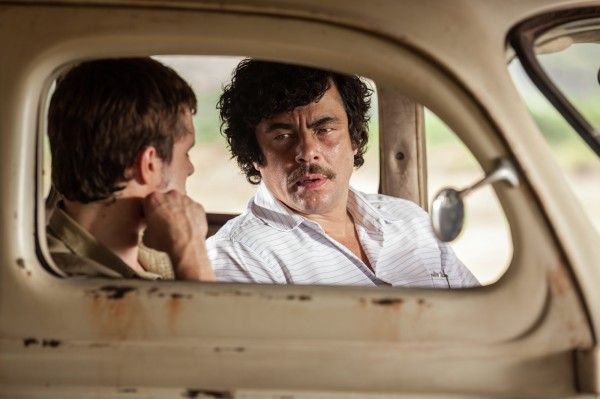Did you know Pablo Escobar was a bad guy? It’s true! He was a powerful, charismatic drug lord who won the love of the people with charitable acts, but he was also a ruthless murderer because that comes with the job description. Andrea Di Stefano’s Escobar: Paradise Lost is painfully predictable as it latches onto Escobar’s reputation to tell a bland, generic thriller that wastes the talent of its lead actors. Di Stefano does flirt with the notion of turning a blind eye to evil, but it’s buried in unbearable melodrama and pretentious religious imagery coupled with a slightly racist undertone of how a first-world guy could get caught up in third-world problems. As for Escobar, we learn he had an odd sense of fashion.
Nick (Josh Hutcherson) is a surfer living in Colombia in the late 1980s, and he ends up falling for Maria (Claudia Traisac), a beautiful local who seems perfect except for one tiny detail: she’s the niece of Pablo Escobar (Benicio Del Toro), friend to the Colombian people and international cocaine kingpin. Pablo takes a liking to Nick, and Nick is willing to overlook the fact that Pablo brutally murdered some thugs who were harassing Nick and his brother Dylan (Brady Corbet). Nick’s actually willing to ignore all of Pablo’s illegal activities, but he’s drafted into his uncle-in-law’s criminal empire when the drug war heats up. Where Nick once thought he could live happily ever after with Maria, he now finds himself in circumstances far beyond his personal safety and his conscience.
Even if Paradise Lost didn’t begin with a prologue where Pablo—amusingly dressed like a high school track coach—gives Nick a mission that involves killing an innocent man, we would have no difficulty in surmising this development. Put a sweet, naïve kid like Nick near a powerful drug lord, and one of two things are going to happen: he’s going to be corrupted or he’s going to realize he’s in way over his head. The former is slightly more interesting, and is actually more in tune with the title “paradise lost” since Milton’s poem relates to original sin. In the context of Di Stefano’s movie, it means that someone rained on your parade.
As the movie rolls on and Nick’s plight becomes more desperate, there’s a sinking sensation that part of the movie’s tension comes from its protagonist having his place of privilege reduced to nothing. That would be an interesting perspective if Di Stefano had viewed his movie through a larger cultural lens, but instead Nick’s circumstances come through as, “I’m white and Canadian! How could this happen to meeeee?!” Because the movie refuses to taint Nick beyond his subconscious request to have Pablo knock off the local thugs, he’s little more than a hapless victim. Perhaps Di Stefano believes willful ignorance is a grave sin, but if so, the laughable melodrama marginalizes that belief.
Di Stefano also can’t commit to the movie’s religious aspect, so it feels exploitative rather than informative. The movie’s opening scene is actually quite powerful as we see Pablo in the middle of the woods in the dead of night, praying to God. It’s an interesting idea that a man so thoroughly steeped in sin believes that God is on his side, but the film never develops the inclusion of religion. The director will occasionally sprinkle in religious imagery—Nick hiding in a church, a crucifix on a doorway, Pablo disguised as an Orthodox priest—but never in a cohesive fashion. Paradise Lost wants to have the weight of religion by proxy.
Perhaps these thematic shortcomings would be tolerable if the performances could carry the picture, but Hutcherson and Del Toro’s talents are depressingly underutilized. I’ve been a fan of Hutcherson since Zathura, and I know he can do more than what Paradise Lost asks of him, which is mostly grinning like an idiot or looking scared/confused. He does sneak in a few good moments like when he hides his nervousness from Maria on their first date, but mostly he’s constrained by his two-dimensional role. As for Del Toro, it seems like he jumped at the chance to play Pablo Escobar even though it’s not really his movie. Yes, he’s powerful, charismatic, and has an interesting choice of wardrobe, but there’s nothing illuminating or thought provoking about the character. He coasts on name recognition and reputation.
The same goes for Escobar: Paradise Lost. There’s no fresh insight into Pablo Escobar, and that wouldn’t be a bad thing if Di Stefano developed the interesting ideas he has swirling around his picture rather than use them for window dressing for a movie where the drama and characters have all the weight of a telenovela.
Rating: D-
Click here for all of our TIFF 2014 coverage. Click on the links below for our other TIFF 2014 reviews:
- The Drop
- Force Majeure
- Haemoo
- The Humbling
- The Look of Silence
- Men, Women & Children
- Mr. Turner
- Nightcrawler
- Pawn Sacrifice
- The Riot Club
- The Tale of Princess Kaguya
- This Is Where I Leave You
- Welcome to Me
- What We Do in the Shadows
- Whiplash




